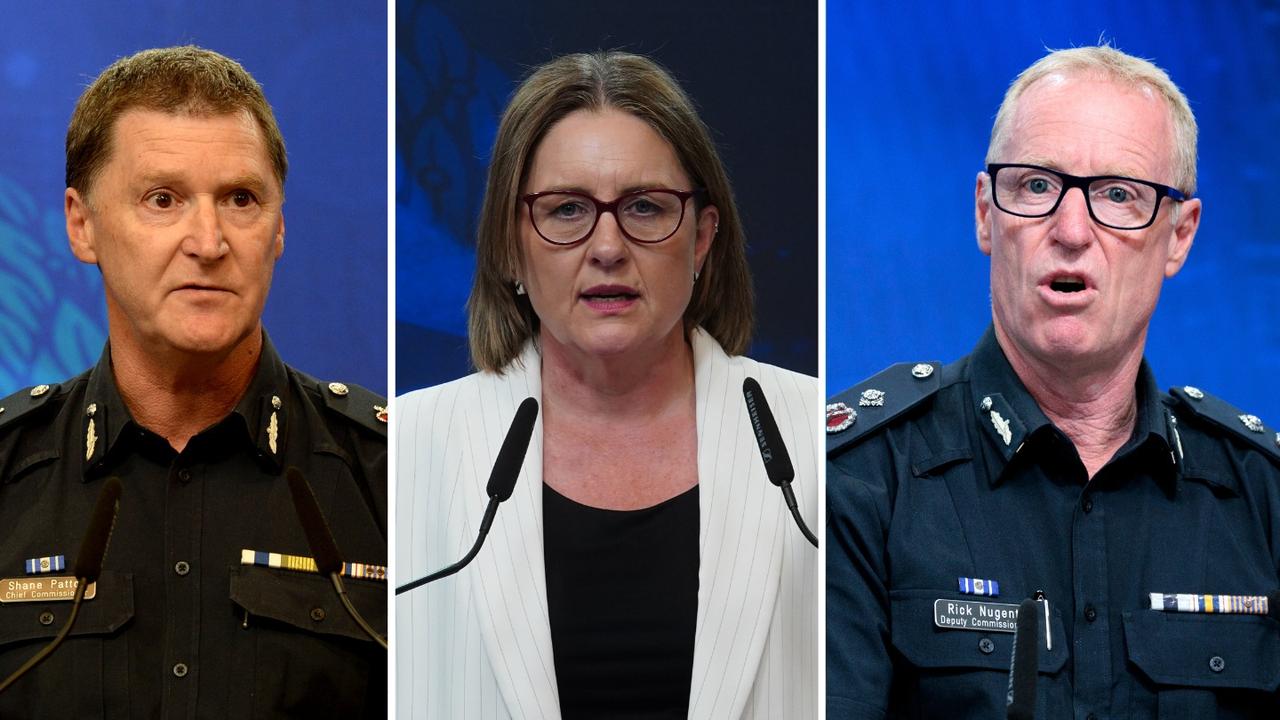ADF chief General Angus Campbell in the dark about navy hero’s hell
Australia’s Defence chief has used his final remarks at the Royal Commission to make a moving vow about the military’s suicide crisis.
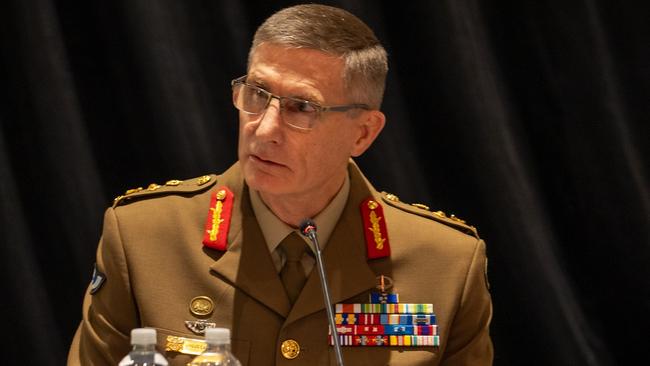
News
Don't miss out on the headlines from News. Followed categories will be added to My News.
Australian Defence Force chief General Angus Campbell has vowed to push for enduring reform in Australia’s military and defence culture to address the suicide crisis that has taken the lives of 1600 servicemen and women between 1997 and 2020 – 20 times the number of service personnel killed on active duty.
General Campbell, appearing as the final witness before the Royal Commission Into Defence and Veteran Suicide on Thursday, closed his remarks with a call for everyone in Defence to “stand up” and build and protect a culture of moral excellence.
“My comment to everybody would be to know and do what is right and when you see that is not what is happening, just stand up and you will be supported.”
The commission has held multiple hearings around the country and has received some 230,000 documents, 5889 submissions and heard from 344 witnesses drilling into the complex issue of suicide and mental health in Defence.
At times, the commission has heard harrowing testimony of dramatic mistreatment of service members, including from The Reverend Nikki Coleman and former Navy diver John Armfield, both of whom grappled with mental health challenges and faced a hostile and abusive culture during their period of service.
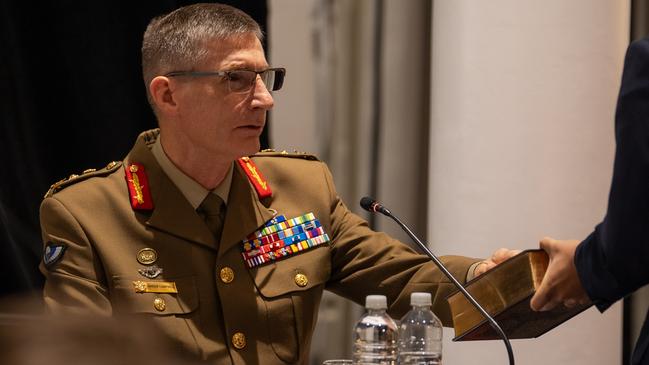
General Campbell, whose tenure as ADF chief ends in June, pledged his “absolute commitment” to prioritise reform and improvement in mental health care in his handover brief to his successor.
“The first point, an absolute commitment to this process and to realising the total value of this process and the Commission’s consideration,” he said.
“Second, an encouragement to continue to drive where unity of force is appropriate, a unitary of force perspective so that so we can maximise the interdependent value can be realised when we are all talking about the same issues, data, strategy and doctrine and same effort to build openness and destigmatisation.
“And then I would add the effort needs to be seen over the duration of their tenure and beyond their tenure to build foundations and build out from foundations so that each senior officer ... across the range of our appointments ... is trying to leave their successor and the organisation better placed to deal with the issues.”
General Campbell said he saw the commission’s work as a “once in a generation” chance to secure cultural change in the ADF.
“We’ve got a lot to learn from our young people,” he said.
Left in the dark
General Campbell was left in the dark for three years about the shocking alleged mistreatment of navy hero John Armfield, admitting to the Royal Commission that he only found out about the jarring allegations while listening to Mr Armfield’s testimony to the commission in early March.
Mr Armfield lost his brother, RAAF Leading Aircraftman Andrew Armfield, to suicide in October 2011, but Mr Armfield only found out about the existence of an internal report into Andrew’s death 10 years after the traumatic event.
When the report was made available to him, he told the commission how he drove to the post office to pick it up without any support in place to help him process the findings, which he said revealed serious failures in his brother’s care.
“I was sitting in my car, broken,” Mr Armfield said.
“I’d loyally served my nation and this is how they’d given me the report on my little brother’s death.
“I sat there and sobbed. I couldn’t take it home to my family.”
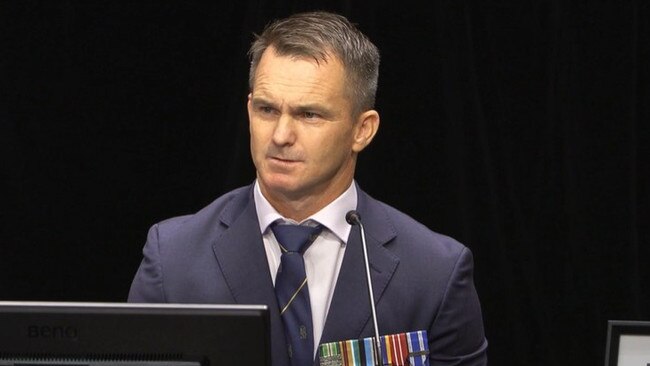
Mr Armfield, an Afghanistan veteran and military recruiter, alleged serious failures in the ADF’s treatment of his brother and also spoke about a hostile culture as he grappled with the circumstances of Andrew’s death.
General Campbell, who speaks in a measured and controlled manner, hinted at an underlying anger at why he had not been informed about Mr Armfield’s case, telling the commissioners that he was working to find out why the information had not been delivered to him.
“It is an issue I am seeking to understand to address,” he said.
“I am seeking to better understand why it is that I come to be aware of this three years late but at the same time have made sure and have ensured it is written into the directions and procedures of our organisation that there is no pathway for material of that nature (the report into Andrew’s death) to be provided to anyone in a fashion that left him alone and unsupported.
“It is very concerning and I asked the question, is this a mistake or is this a systemic problem continuing? That is yet to be resolved.”
The questions come after NCA NewsWire exclusively revealed that General Campbell had sent a letter of apology to Mr Armfield ahead of the General’s appearance at the commission on Thursday.
In the March 18 letter, General Campbell apologises “sincerely and fulsomely” to Mr Armfield.
“I wanted to commend you for your courage, clarity and dignity in detailing your lived experience around both the tragic loss of your brother, Andrew, and the events you encountered post that time,” General Campbell writes.
“I sincerely and fulsomely apologise for the experiences you have had and the traumatic impact those actions had on you.
“The Royal Commission is an important opportunity for Defence to further understand the complex issue of suicide.
“Thank you for sharing your account and for your continued support to the Royal Commission’s final report and recommendations.”
The diver left the military in 2023 after 20 years of service and he is now writing a book, titled Leadership Failure, about his experiences.
Suicide database still a distant prospect
Building a database to aggregate and centralise information about suicides in the ADF is still some way off, with General Campbell confirming the ADF’s plan for a database is facing thorny legislative and privacy obstacles.
“There are some key issues with regard to that database with the question of data sharing and legislation and its interrelationship would greatly benefit from the possible findings of this royal commission,” he said.
In his earlier appearance at the commission in 2022, General Campbell said a database between Defence and the Department of Veterans’ Affairs offering up a rigorous view of numbers and circumstances around suicides would be a crucial piece of reform to address the suicide challenge.
He said there had been “very positive work” on the database since 2022, but progress was slow.
No easy way to predict suicide risk
General Campbell said the ADF found it “very difficult” to predict suicide risk and target resources to any particular cohort within the force.
He said expert advice from the military’s mental health professionals recommended a “universalist” approach to battling risk in the force given the wide and changing variety of roles that may intersect with traumatic scenarios.
“We have not yet been effective at being able to be predictive and, hence, preventative in a targeted sense with regard to suicide and suicidality,” he said.
“In terms of psychosocial risks that may emerge, that may contribute to suicide or suicidality, given that those risk factors emerge through the individual perception as much as an external reality, and perception in this case is reality, then it is made more difficult to be confident that we have particular places or spaces where we can target (suicide risk).
“And also with a recognition that if there are places that we might seek to target, and I think periodically there are … but in circumstances more generally we have also the challenge that some of those factors may either be expressed by people who vicariously are generally associated in geography or in work space but are not the ones that we thought that we should be targeting.”
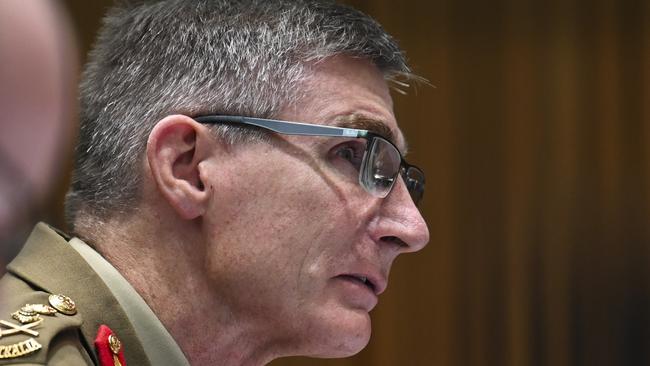
Erin Longbottom KC, counsel assisting the commission, pressed the General for the evidentiary basis propelling a universalist approach rather than a more committed and specific research approach drilling into particular groups within the force.
General Campbell said the philosophy emerged from Joint Health Command and its recognition of the fundamental stressors inherent in military activity across the force.
“I think the question invites the cherrypicking of positions across a force which is designed for war fighting in which the entire force or elements of it across time and space may be exposed to aspects that lead to psychological trauma,” he said.
“And in those circumstances, an active and universal approach, particularly where we find it difficult to be predictive and we find it difficult to be confident of the individual or the role rather than subsidiary or casual supporting roles and the experience of it is or isn’t anywhere across the force going to be an indicator of psychological health outcomes.”
‘Do the right thing’
General Campbell said the ADF should not be concerned with reputation management as it dealt with allegations of misconduct, saying its senior leadership and 100,000-strong workforce should only concern themselves with “doing the right thing”.
“I believe that Defence should do the right thing and by doing the right thing reputation, good or bad, emerges from others,” he said.
“And not just in this setting but in many circumstances wherever I hear people expressing concern about reputation, my immediate response is our job is to do the right thing. Others will choose to give us a reputation that we deserve.”
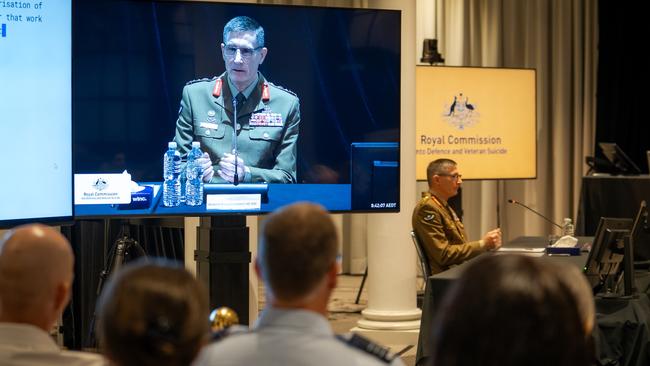
Ms Longbottom suggested the “timing” of General Campbell’s apology letter to Mr Armfield may have been an exercise in reputation management, but General Campbell rejected her proposition.
“The testimony given by Mr Armfield I thought was both very affecting and confronting but also very directly engaged my accountability,” he said.
“And so I felt it appropriate that I write to him. It was through his testimony the first occasion upon which I was aware of the manner in which he received that inquiry report.”
‘Outrageous: General defends personnel who lost their lives to suicide
General Campbell has rebuked any suggestion service personnel who take their own lives lack resilience or might have “let down” the Defence force.
“I completely reject that view,” he said.
“That is just outrageous, we have let them down.
“Courage is something that like a cup can fill and then there is no more space and that person is traumatised, is deeply affected.
“So when I hear that we aspire to resilience, I think that’s a good aspiration to have but how to truly deeply measure whether it has been achieved, I think that is illusory.”
Defence boss hits back at bombshell report
General Campbell has defended his response to the controversial Brereton inquiry on the same day a new bombshell report criticised senior Defence leaders for allegedly failing to take responsibility for command failures in Afghanistan.
The Afghanistan Inquiry Implementation Oversight Panel, set up to examine the findings of army reserve Major General Paul Brereton’s Afghan Inquiry, concluded the Brereton inquiry had “exempted the highest levels of Defence leadership at the relevant times of any responsibility for the grave misconduct which occurred in Afghanistan”.
“They were not required to give evidence to the Inquiry or included in the inquiry’s attribution of accountability for any war crimes. The lack of any accountability at that level is bitterly resented by many former and present members of special forces and the Defence family,” the report notes.
At a hearing before the Royal Commission Into Defence and Veteran Suicide on Thursday, General Campbell came under stern questioning.
He rejected the notion senior leadership did not take responsibility for the serious military failures, claiming his public apology was evidence of the opposite.
“I think I stood up in front of our nation and took responsibility and apologised to Australia,” he told the commissioners under questioning from Ms Longbottom.
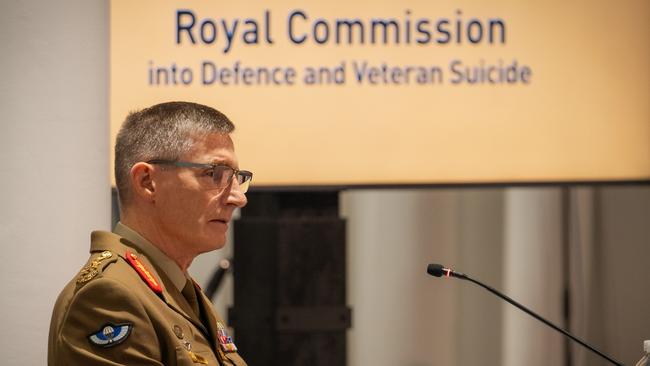
“To all those Defence personnel who were affected and to those in Afghanistan who may have been affected by the credible information of unlawful conduct that Justice Brereton identified.”
The oversight panel, made up of former inspector-general of intelligence and security Vivienne Thom, former secretary of Attorney-General’s Department Robert Cornall and University of Tasmania vice-chancellor Rufus Black, found unlike civil society, Defence did not take responsibility for alleged criminal behaviour from Australian Special Forces troops during the Afghanistan war.
The conclusion appears to vindicate former and current Special Forces troops and their families who have long claimed they were made scapegoats to protect the military’s integrity and top brass.
The Brereton inquiry found that alleged criminal behaviour was concealed at patrol commander level and that’s where responsibility lay.
General Campbell told the commissioners the Brereton report had triggered reflection and reform at the highest levels of the ADF.
“The Afghanistan inquiry report was a very dramatic, challenging and extremely confronting reflection on the profession of arms, on leadership, on command and on trust between the different components of our organisation and, indeed, without our different elements of the organisation,’ he said.
“And it was extensively discussed, reflected upon and learnings and evolutions and reforms had been widespread across the organisation, and in particular across relevant areas that were identified by Justice Brereton.”
‘I am committed to doing better’
In his opening statement before the commission, General Campbell apologised “unreservedly” for what he called organisational “deficiencies” that let down ADF members during their service and post-service life.
“Our people deserve and should rightly expect the wellbeing and care they need both during and after their service,” he said.
“I am committed to doing better.”
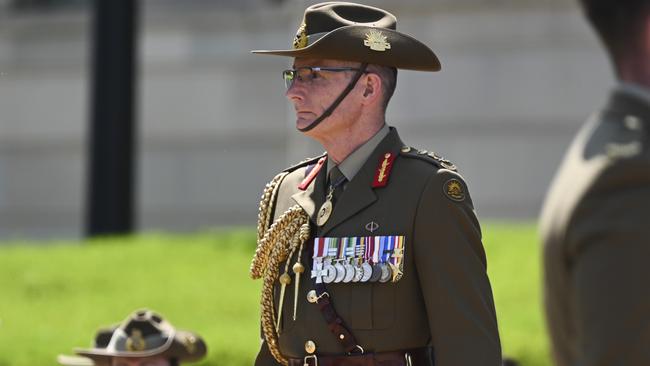
The move to a ‘unitary’ system
The General said a basic organisational failure that had prevented the ADF from addressing the problem of suicide effectively in the past emerged in part from the military’s “disaggregated” nature or splintered policy settings and cultural practices between the different service branches.
He said the ADF was now moving to a “unitary” system, with common policy settings and expectations across the different branches.
In a disaggregated system, the data and analysis of a problem was splintered, but with a more unified organisation, clearer problem-solving mechanisms could emerge, he argued.
“There has been a considerable focus in the period of my tenure … of seeking to very deliberately build that single enterprise, integrated view that allows us to take a significant step beyond some of the inadequacies,” he said.
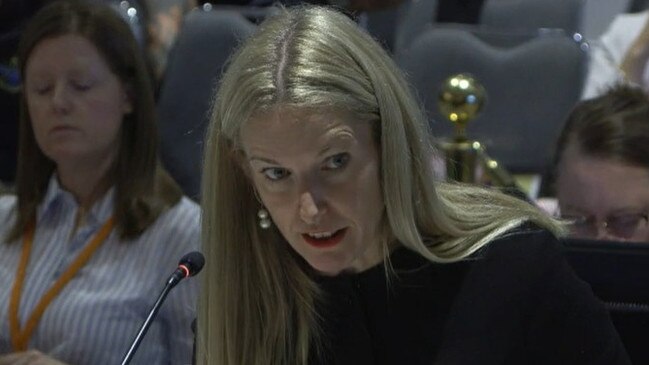
There are 100,000 people in the Defence community and General Campbell said he had moved that massive workforce onto a single and common foundation of expected behaviours, norms and cultural values.
He said this common foundation would increase the likelihood of improvements in a range of spheres.
“I am determined to drive change and I think we are driving change in the right way,” he said.
Battling ‘exceptionalism’, ‘masculinity’ and ‘tribalism’
Commissioner Peggy Brown asked General Campbell whether traditional cultural values of ‘exceptionalism’, ‘masculinity’ and ‘tribalism’ within the ADF might contribute to Defence’s suicide crisis.
In one instance, the commissioner suggested a masculine “warrior culture” might stop Defence members from seeking help for psychological problems.
General Campbell appeared to agree in part with Dr Brown’s concerns and said he was working to change cultural values in the ADF.
“They express an extreme, they don’t express the norm,” he said.
“We are very alert to those extremes.”
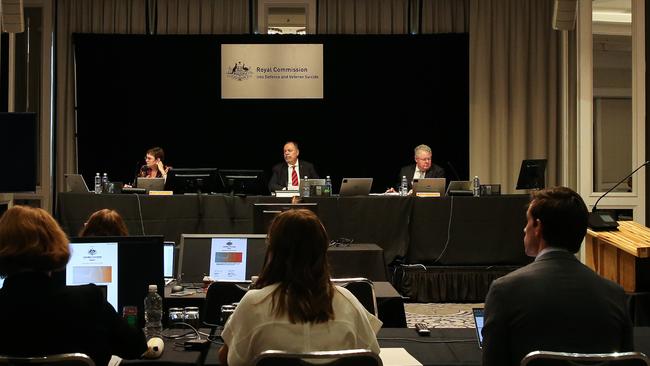
He said the idea of exceptionalism was “a perspective that is rejected by the ADF as deeply damaging”.
On the issue of masculinity, General Campbell said the ADF was working to lift the proportion of women in Defence, which he said had made “profound contributions to our capability”.
On tribalism, General Campbell said there was value in Defence members feeling a connection within their team, but if their identity prevented connection with other components of the force, then “your identity is no longer serving our nation”.
The ‘right’ culture
General Campbell said the ADF was embedding a common cultural foundation across its dispersed workforce, built on a common set of values and expected behaviours.
He said the values of service, courage, respect, integrity and excellence constituted the key pillars of the ADF’s new culture, with character and behaviour expectations flowing down from them.
“It is everywhere. Multiple publications, signage, lesson plans. It is an expected requirement that people know what our values are,” he said.
“The Defence Force is not separated from the Australian community, but certainly seeks to highlight the best values of the Australian community.”
The General acknowledged that abuse of power and unacceptable behaviour within the ADF increased risk factors for suicidality.
“Wherever people do not feel that they are being included, that they are being respected, that they are given opportunity to grow and develop, that is a cultural space in which the risk factors are rising and the protective factors … are diminishing,” he said.
“That’s why I think culture is so critical.”
Getting past stigma
General Campbell said a widespread fear of stigma around mental health was a key factor stopping service personnel from accessing health care.
A mental health issue can affect a service member’s medical employment classification status, which can have an impact on deployments and opportunities within the military.
The General said it was “very difficult” change the cultural mindset in the Defence community that might lead to more open reporting of mental health problems.
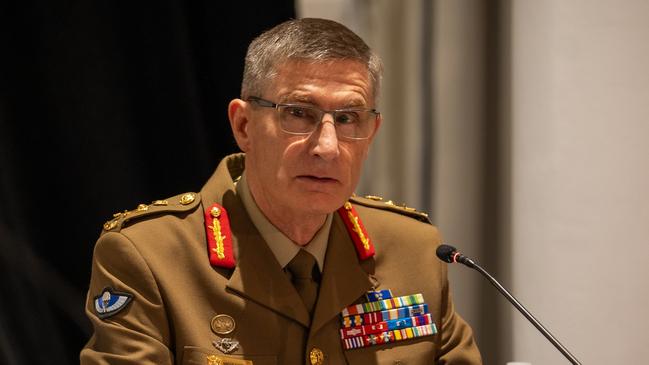
“This is a constant conversation and one in which things like mental health awareness days and ‘Are You OK’, the mandatory training sessions that are held, the encouragement at a whole lot of levels but particularly at the local, tactical team level of encouraging and speaking about issues and that mindset that seeking help may see you not participate in tomorrow or the next activity but will enable you to partner in many activities beyond,” he said.
“We want a community who is confident to speak of these issues. It is very difficult.”
Reporting pathways
A core area of investigation from the commission is whether reporting pathways separate from the chain of command dealing with misconduct in the military should be formalised.
General Campbell lent his conditional support for reporting options to independent bodies.
“I think that there should be a range of reporting pathways for any form of behaviour or conduct that is inappropriate, unacceptable, that is not in keeping with Defence values and behaviours,” he said,
“I think the answer is to look at the ecosystem of reporting pathways and to consider whether you think it is sufficient and to consider whether additional pathways may be appropriate or whether you feel some of the pathways that exist now should be removed and a different or additional pathways added.
“I think that one pathway is wrong. I also think that too many pathways can be confusing.”
General Campbell’s service
General Campbell has served Australia in multiple high-end capacities since joining the Australian Army in 1981.
In 2001, General Campbell was deployed to East Timor as a commanding officer with 2RAR.
He assumed the role of ADF chief in 2018.
He holds a bachelor degree from the University of NSW and a Master of Philosophy in International Relations from Cambridge University.
Originally published as ADF chief General Angus Campbell in the dark about navy hero’s hell


